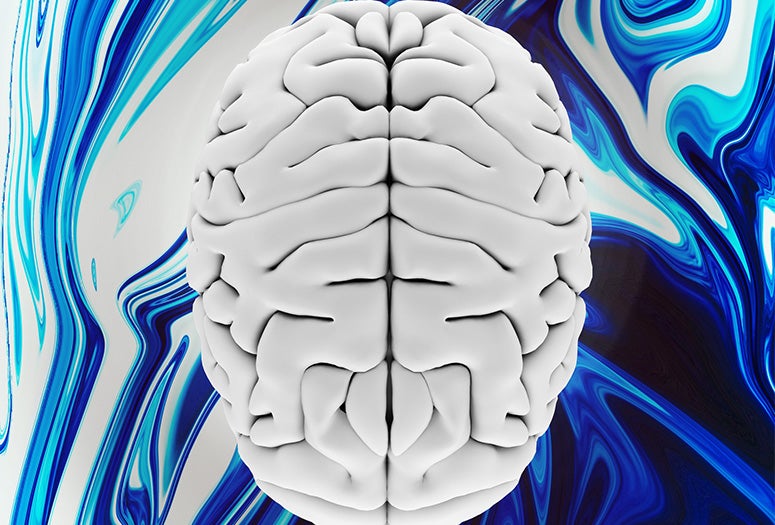
Psychedelic therapy has emerged as an area of growing interest in mental health research with several clinical trials underway in the United States evaluating the effectiveness of mind-altering drugs on mental health disorders such as depression, anxiety, post-traumatic stress disorder and more.
A recent symposium organized by Rice University’s ENRICH (Educational and Research Initiatives for Collaborative Health) and the Rice Neuroengineering Initiative (NEI) as part of the Meeting of the Minds NeuroNetworking Series explored ethics and policy in brain science today, including in the context of psychedelic-assisted therapy.
The featured panelists were two leading experts on the ethical, legal and social implications on neuroscience research: Khara Ramos, vice president of neuroscience and society at the Dana Foundation, and Amy McGuire, director of the Center for Medical Ethics and Health Policy and professor of biomedical ethics at Baylor College of Medicine.
Ramos leads the programmatic strategy and grant-making activities of the Dana Foundation, a nonprofit organization dedicated to advancing “neuroscience that benefits society and reflects the aspirations of all people.”
In her talk, Ramos provided a high-level view on the intersection of neuroscience and society, underscoring the need for thoughtful policy as novel neurotechnologies emerge. She stressed the importance of community engagement and interdisciplinary collaboration in shaping ethical frameworks.
Speaking on the foundation’s 75th anniversary, Ramos pointed out that starting in the 1990s, the Dana Foundation “pivoted to focus on neuroscience research and public outreach about the brain, including by starting Brain Awareness Week, a global campaign to raise awareness around the brain.” In 2002, the foundation sponsored a landmark gathering on the ethics of brain research. This event was “a founding moment for the field of neuroethics,” Ramos said.
While the foundation does not directly fund neuroscience research, its focus on education, training and public engagement efforts at the intersection of neuroscience and society bridges the gap between work in the lab and its application and impact in society, developing new models and platforms to connect neuroscience researchers and scholars with public audiences.
“I think there’s a real disconnect between society and academia, and we all have to play a part in fixing that,” Ramos said, citing the social contract between science and society, a model she traced back to the post-World War II era and a policy by the federal government to “invest in science and technology for societal progress, not just for health but for economic competitiveness [and] national security.
“We have to think longer term about the opportunity … to reimagine and reinvigorate this social contract between science and society,” Ramos said.
McGuire opened the discussion by emphasizing the potential of using psychedelics in health care.
“I think psychedelic medicine is an incredibly exciting and novel area of research, and I feel very strongly that we in the Texas Medical Center can lead in this space, but I really feel like we can only do that if we do it together,” she said.

McGuire started a program at Baylor College of Medicine called ELIPSIS (Ethical Legal Implications of Psychedelics in Society Program) that is conducting research on the responsible integration of psychedelic-assisted therapy.
“We have students from across the Texas Medical Center who are interested in thinking about the ethical and policy issues associated with psychedelics, including several students from Rice,” said McGuire, who has extensive experience studying ethical and policy issues related to emerging technologies, including issues around the clinical integration of genetics and genomics and, most recently, new neurotechnologies like deep brain stimulation and adaptive brain stimulation devices.
Since 2018, McGuire said that we have seen an increase in the number of psychedelic clinical trials in the U.S. as well as a surge in public enthusiasm for psychedelic medicine. The growing popularization of psychedelics has raised concern that media hype might undermine the science. McGuire pointed out that different areas of science experience a similar dynamic, where the research is moving apace, but “public enthusiasm is ahead of it, and the policy is lagging behind.”
In 2023, a phase 3 study of MDMA-assisted therapy for PTSD and a phase 2 study of psilocybin-assisted therapy for depression were published, both showing great results. A New Drug Application was submitted to the FDA for the MDMA-assisted therapy, and there was optimism that it would be approved, but that did not ultimately happen.
McGuire went over some of the scientific and ethical concerns raised during the FDA review process, such as functional unblinding ⎯ the fact that it is easy for trial subjects to determine whether they were in the control group or not raises questions about bias and study validity; the role of psychotherapy in clinical trial outcomes ⎯ the FDA only regulates drugs and drug products and not the practice of medicine or the condition of use; and the potential for abuse.
In conclusion, she stressed the importance of rolling out new treatments in ways that are not only scientifically sound but also socially responsible.
“I think this is an area that has tremendous potential, but we don’t want to repeat the mistakes of the past,” she said.
As a hub of cutting-edge, multidisciplinary research on the brain, Rice is committed to providing avenues for collaboration and discussion around critical topics in neuroscience, brain health and the intersection of research and societal impact.
“In addition to a critical mass of researchers focused on the brain, Rice is home to entities dedicated to collaborative clinical and scientific research on the nervous system,” said Behnaam Aazhang, the J.S. Abercrombie Professor of Electrical and Computer Engineering who leads the NEI. “Meeting of the Minds NeuroNetworking Series plays a crucial role in bringing together these multidisciplinary experts to drive innovation from fundamental discoveries to real-world applications, helping Texas become the world leader in this rapidly evolving field.”

